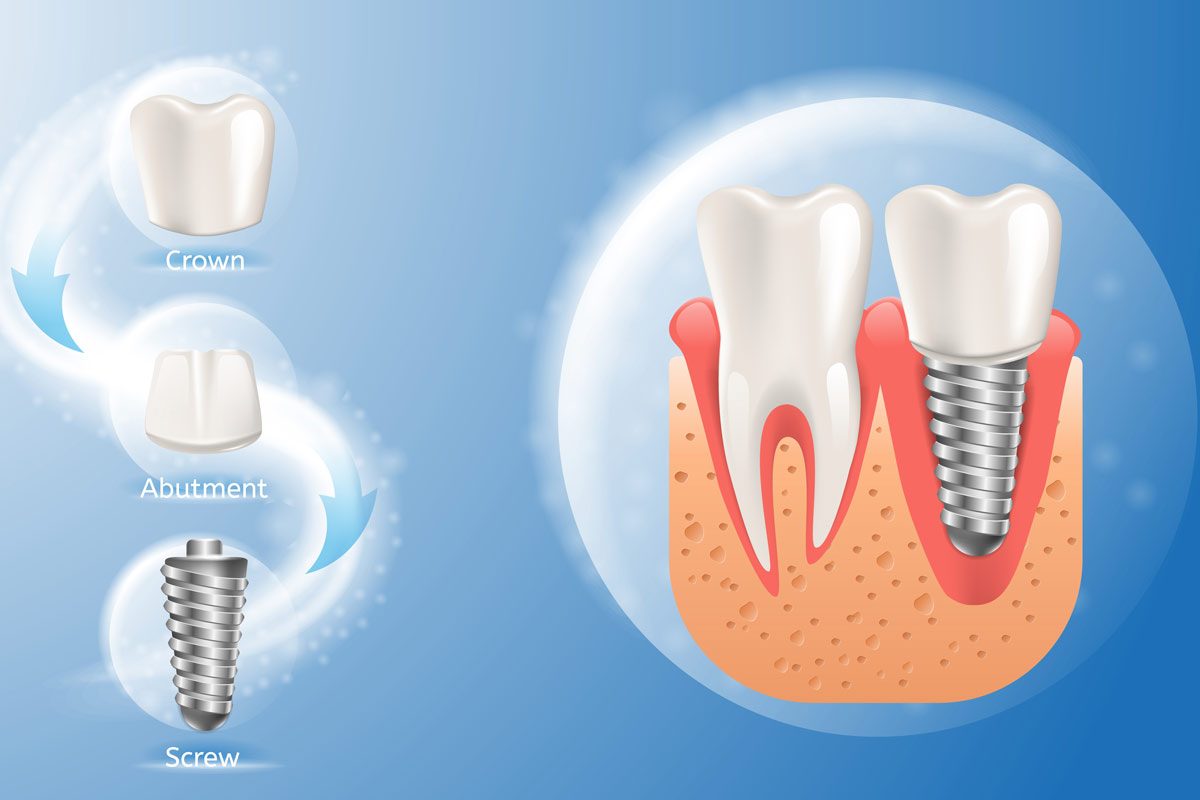- Gum disease can result in tooth loss.
- Dental implants replace a missing teeth.
- Healthy gums are necessary for implant placement.
- Gum disease can develop even after the placement of a dental implant.
- Gum disease can cause a dental implant to fail.
Let’s take a deeper look in the relationship between dental implants and gum disease.
What Is Periodontal Disease?
Periodontal disease, perhaps best known as gum disease, is a common oral condition that results in swollen, inflamed, sore, and tender gums. Bacteria in plaque accumulating on and around the gums causes this gum infection, also known as periodontitis. The symptoms of gum disease include red, swollen, and sensitive gums, but the condition can also cause gum recession, leading to lost teeth. Gum disease is the leading cause of tooth loss in people. Known Risk Factors for Periodontal Disease:
- Tobacco use
- Genetics
- Stress
- Medications
- Clenching and grinding of teeth
- Diabetes
- Poor diet
What Are Dental Implants?
Dentures are no longer the only option for restoring missing teeth, thanks to advancements in dentistry. Instead, dental implants are an excellent solution if you’ve had enough of uncomfortable and poorly fitted dentures.
A permanent solution to replace one or more lost teeth is dental implants. Implants are placed under the gums where the tooth roots would have been during the operation. Following completion of this procedure, the implants are fitted with a bridge, crown, or other similar fixture. In most cases, acrylic or porcelain creates the crown or bridge, giving the implants a natural-looking appearance and feel.

Does Gum Disease Disappear When a Tooth Is Extracted?
Extraction is frequently the best course of action when losing a tooth is unavoidable. However, gum disease won’t magically disappear after a tooth loss or extraction. If not treated, it will develop and spread, possibly resulting in the loss of more teeth. Even if you lost a tooth due to an accident or another problem and weren’t already suffering from gum disease, the gap in your mouth can make you more likely to get the condition. This is because your gums and bone start to deteriorate, recede, and even dissolve when missing a tooth. As a result, pockets are formed that are ideal for bacterial growth. Talking about your tooth replacement choices is crucial if you’re missing one. However, if you have gum disease, you must deal with each issue separately.
Can Someone with Gum Disease Have an Implant?
The short answer is “no.” You must have healthy, strong gums to receive a dental implant. Unfortunately, as mentioned, gum disease weakens and dissolves this tissue and bone. As a result, even after you’ve treated the condition, your gum tissue and jawbone may be too weak to sustain an implant.
Your jawbone must be strong and wide enough to support the implant during treatment. Your gum tissue must also surround the implant and final restoration. If so, you might be a candidate for a soft tissue or bone graft. These techniques are both widely used and effective. You’ll be a much better candidate for a dental implant after the procedure ends and you have had some time to heal. There are not many people who cannot have implants thanks to this and other procedures.
Do Gum Disease Affect Dental Implants?
If you currently have dental implants, you may worry about how gum disease can harm them, which is understandable. Periodontal disease can impact dental implants because it spreads and can damage the bone that supports the implants over time. If this happens, the implants will eventually fail. Dentists use the precise term “peri-implantitis” to describe this condition. This serves as yet another reminder of the importance of maintaining proper oral hygiene, even if you have dental implants.

What Is the Most Effective Peri-implantitis Treatment?
It’s critical to be aware of the warning symptoms and take quick action if you worry your dental implants will fail. Fortunately, maintaining proper oral hygiene is the most effective strategy to treat and prevent peri-implantitis. Always visit the dentist at least once every six months, even if you brush twice daily, floss regularly, and use an antibacterial mouthwash.
Contact us at ORIS Dental Clinics immediately if you live in Richmond Hill, Ontario, and your dental implant is failing rather than waiting for it to worsen.




